ROBERT WILLIAMS BUCHANAN (1841 - 1901)
|
ROBERT WILLIAMS BUCHANAN (1841 - 1901) |
|
|
|
|
|
|
|
|
{North Coast and other Poems 1867}
55
I. O THOU whose ears incline unto my singing, I have to utter dread things of man’s heart; And yet I am no wielder of the thunders; I have a word to leave upon my tombstone; And love and sorrow and wrong shall scent my song; 56 For I have stains upon me, and am base:
II. O thou whose ears incline unto my singing, Even as a meteor-stone from suns afar, Sweet, sweet it is to sit in leafy places, And sweet it is to sail on purple waters, And sweet it is to watch the blue-maned lightning 57 Thou lov’st all grand and gentle and sweet things,— And unto thee all seasons utter pleasure: And Summer, in her gorgeous loose apparel; Yea, everywhere there stirs a dreamy beauty, Yet nought endures, but all their glory fadeth, 58 III. The world is wondrous round thee — GOD’s green world— Yet evermore a trouble doth pursue thee,— Thou gladdenest in the glad things of the world, Thou saddenest in the sad things of the world, Thy trouble grows tenfold when thou beholdest Thou seest the good man tear his hair and weep; 59 The silken-natured woman is a bond-slave; The gifts of earth are given to the base; How shalt thou reconcile these bitter things? How shalt thou ask for more from him who singeth?
IV. The singer is the curious-eyéd man For where His robe has brushed grow grass and pansies, 60 And from His strange mysterious robe, in passing, There is no place so wholly desolate Have I not found them in an outcast’s hair? And ever, when he comes upon such tokens, And ’tis his task to put on blearéd eyes There is no hope but one for him who singeth,— 61 Is there a cheek on earth he would not kiss?
V. All is not o’er if loving is not o’er: He sitteth not within a purple chamber; He knoweth the dark windings up to GOD; He hath no stool to sit and suck his thoughts on; The eyes of men and women love the distant; 62 But, lo! the singer passeth by, and straightway And long thin lines of meaning gleam afar off, And evermore the singer’s soul is troubled, And evermore, in those consummate moments, And o’er the wastes where weary eyes are watching,
[Note:
63
TIMOTHY. WELL, here’s the cuckoo come again, after the barley sowing,
JACOB. Ah, him that used to work with Bourne! Bourne told me how he blundered.
TIMOTHY. All trash and stuff and tattle!
JACOB. That’s where it lies! We get no good by asking questions, neighbour: |
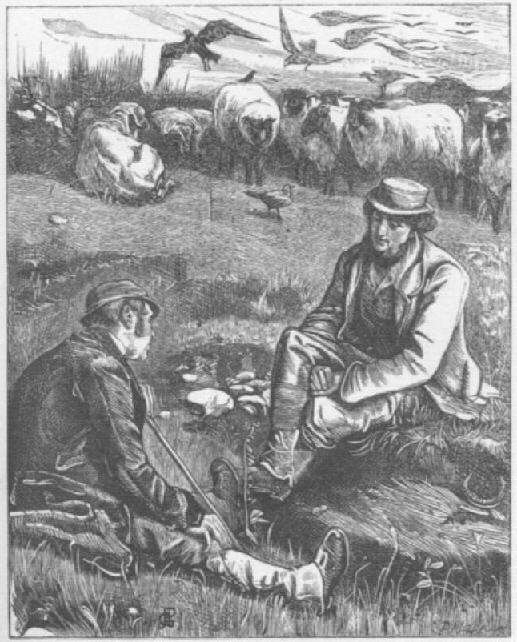 |
|
Parsons are sent to watch our souls, while we are hard at labour:
TIMOTHY. You’re right! No man as grumbles so with this here world has thriven;
JACOB. But Bourne soon sent him packing off—Bourne’s just the sort of fellow; 68 TIMOTHY. He got another master, though, but soon began to tire him;
JACOB. ’Tis just the way with Methodists. Give me the High Church, neighbour.
TIMOTHY. ‘Why don’t you be a man?’ said they, ‘keep clean, and do your labour?’
JACOB. His head was gone, that’s clear enough—the chapel set it turning. 72 TIMOTHY. Now, this is how I look at it, although I have no learning:
[Note:
73 (NORTH COAST. COVENANT PERIOD.)
BAR the door! put out the light, for it gleams across the night, It was down on Drumliemoor, where it slopes upon the shore, How! Sit at home in fear, when GOD’s voice was in mine ear, Each mortal of the band brought his weapon in his hand, 75 |
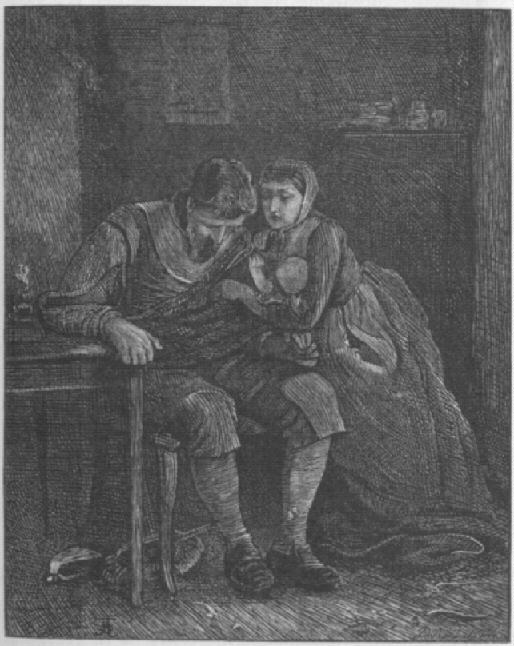 |
|
Oh, solemn, sad, and slow, rose the stern voice of Monroe, And when, with accents calm, Kilmahoe gave out the psalm, It was terrible to hear our cry rise deep and clear, |
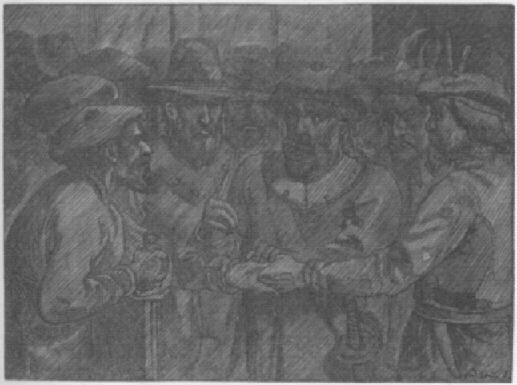 |
|
And heark’ning, with clenched teeth, we could hear across the heath Then a shriek of men arose, and the cursing of our foes— As we struggled, knowing not whose hand was at our throat, O GOD! it was a sight that made the hair turn white, 79 Ay, and thicker, thicker, poured the pale silence of the LORD, Then we beheld at length the troopers in their strength, Oh, shrill and awful rose, ’mid the splashing blood and blows, Then we fled! the darkness grew! ’mid the driving cold we flew, |
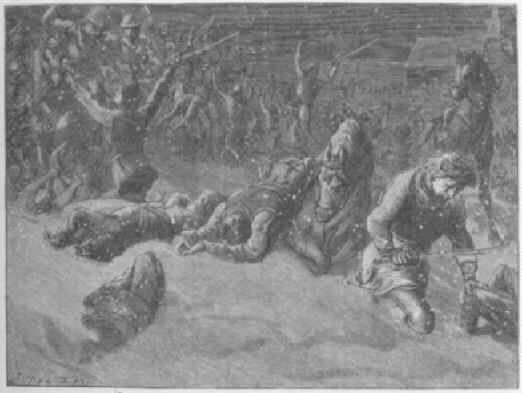 |
|
Ah! gathered in one fold be the holy men and old, Ay, on mountain and in vale our women will look pale, 82
[Note:
83
BELL from the North hath journeyed hither; The mountains own her for their daughter; In the strange streets she stops to listen, And oft, while wondrous-eyed she wanders, Long have the clouds and winds been by her, Yea, she hath been a frail flower, lying |
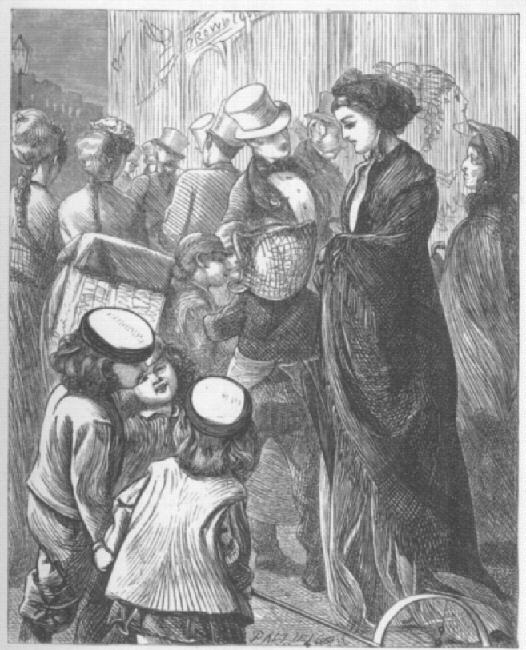 |
|
Yea, then the serpent lightning often [7:1] Watched her with eyes that seemed to soften, When mighty shapes had love and pity, She is as sweet as maidens may be, Yet seems she made in mortal fashion,— [10:1] No pantaloon, no simpering sinner, 87 And such a one his plaint should utter Bell from the North, how shall I win her? Lo! here the things of power are meaner, And, oh! the singing must be mournful; [15:1] The life-cloud round me thunders, lightens; If, ere the song be uttered duly, And she will come (while up above her 89 And surely, when she wanders thither, [Notes: |
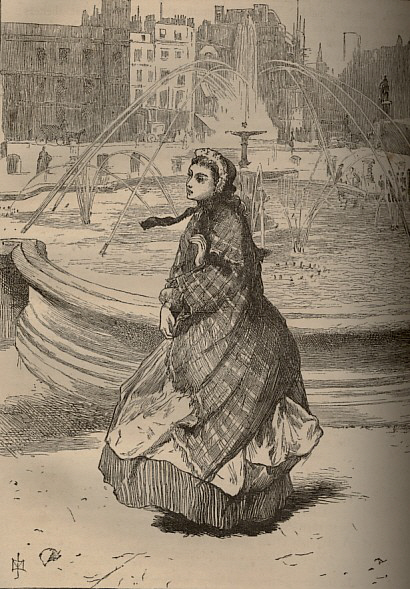 |
|
90 (LONDON)
STOP! that’s your training. You’re too hard, I say, |
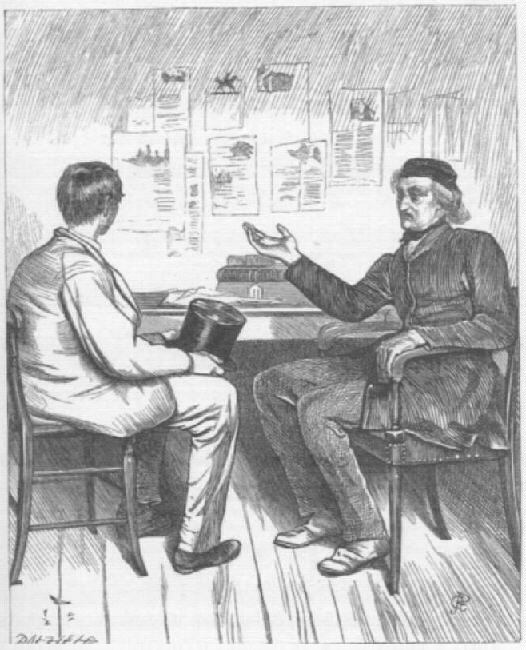 |
|
How did I know that you were country bred? Yes, friend, I am the man who makes the rhyme; But these are poor weak things, although they pay; 93 Ah, many a night I’ve tried to speak my mind,— Last year I tried it hard, but all in vain, He had been bred among a wicked crew, And so, whenever I had time to spare, 95 He knew full well his time was short below, And it was summer, and the days were fine, It was a sight to make a man’s heart ache Pale was his face and fearful as he spoke: I stared at first, because it seemed so new; But when my stock was done, and still the lad Then I was touched to see him grieving so, |
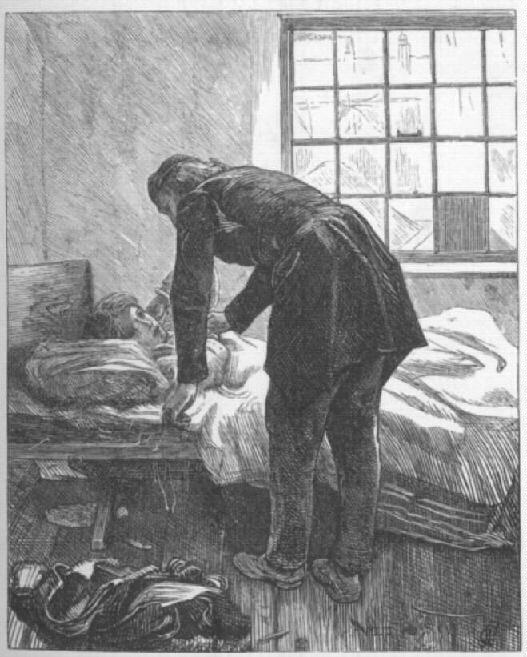 |
|
‘Say it again!’ cried little Jem; and when,
I. Oh, London is a dismal city,
II. Oh, who would struggle and struggle 101 III. There’s green fields, flowers, and cresses
That was the song, and o’er and o’er to him But while my heart was full of things like these, And even then, far, far away, I seemed Ah! many a time, amid the hum of town, _____
North Coast and other Poems continued or back to North Coast and other Poems - Contents
|
|
|
|
|
|
|